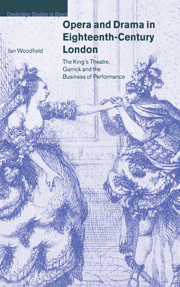 Opera and Drama in Eighteenth-Century London
Opera and Drama in Eighteenth-Century London Published online by Cambridge University Press: 22 September 2009
Brooke's growing experience as an opera manager is shown by the fact that her preparations were much further advanced in the summer of 1775 than they had been the previous year. The major stars, Gabrielli, Rauzzini and the new buffo Trebbi, were all under contract. One important matter remained to be resolved – the programme. Well aware of the lack of good opera buffa repertoire in London, Brooke took active steps to seek out new works from the best composers in this genre. The continuing popularity of Piccinni's operas in London made a new work from this source a very attractive proposition, but she would have known, as a result of Burney's earlier approach on behalf of Hobart, that it was unlikely the composer would agree to make the journey to London. Paisiello's works were not yet known to London audiences, but his music had greatly impressed Burney during his Italian journey. After first hearing Le trame per amore in Naples in 1770, he wrote: ‘it was full of fire and fancy, the ritornels abounding in new passages, and the vocal parts in elegant and simple melodies, such as might be remembered and carried away after the first hearing, or be performed in private by a small band’. The strength of this recommendation from her knowledgeable adviser was enough to persuade Brooke to open negotiations with the composer, with a view to bringing him to the King's Theatre the season after next.
To save this book to your Kindle, first ensure no-reply@cambridge.org is added to your Approved Personal Document E-mail List under your Personal Document Settings on the Manage Your Content and Devices page of your Amazon account. Then enter the ‘name’ part of your Kindle email address below. Find out more about saving to your Kindle.
Note you can select to save to either the @free.kindle.com or @kindle.com variations. ‘@free.kindle.com’ emails are free but can only be saved to your device when it is connected to wi-fi. ‘@kindle.com’ emails can be delivered even when you are not connected to wi-fi, but note that service fees apply.
Find out more about the Kindle Personal Document Service.
To save content items to your account, please confirm that you agree to abide by our usage policies. If this is the first time you use this feature, you will be asked to authorise Cambridge Core to connect with your account. Find out more about saving content to Dropbox.
To save content items to your account, please confirm that you agree to abide by our usage policies. If this is the first time you use this feature, you will be asked to authorise Cambridge Core to connect with your account. Find out more about saving content to Google Drive.